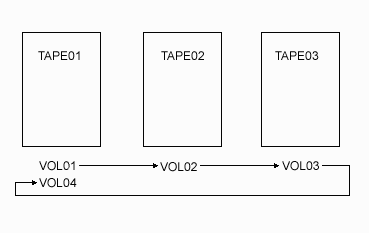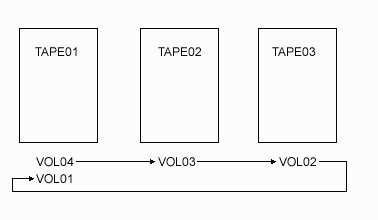Learn about the different formats used for tape data files and how they should be used.
A tape data file contains output records produced by an application program. These files are used to store data on tape media. The tape data files are stored and accessed on tape by a tape device file.
The different data files that exist are:
- Single volume – A file that is contained on one volume of tape.
- Multivolume – A file that is contained on more than one volume of tape.
- Multifile volumes – Volumes of tape that contain more than one data file.
If you use multivolume-tape data files, then follow these conventions:
- The labels on each volume must be consistent. You cannot have standard labeled tapes and unlabeled tapes in the same tape group.
- Write all volumes and density in the same character code (EBCDIC or ASCII).
- Each tape in the group must have the same record format, block length, and record length.
- If you specify more than one tape device, then place the volumes on the
devices in the sequence that is specified in the tape device file. Refer to
the following reference: Figure 1. For example:
- The data file consists of four volumes, such as VOL01, VOL02, VOL03, and VOL04.
- The tape devices specified, in order, are TAPE01, TAPE02, and TAPE03.
Then place the volumes on a tape device as follows: VOL01 on TAPE01, VOL02 on TAPE02, VOL03 on TAPE03, and VOL04 on TAPE01.
If you use volumes, in reverse order, by reading backwards, then VOL04 is on TAPE01, VOL03 on TAPE02, VOL02 on TAPE03, and VOL01 on TAPE01.

